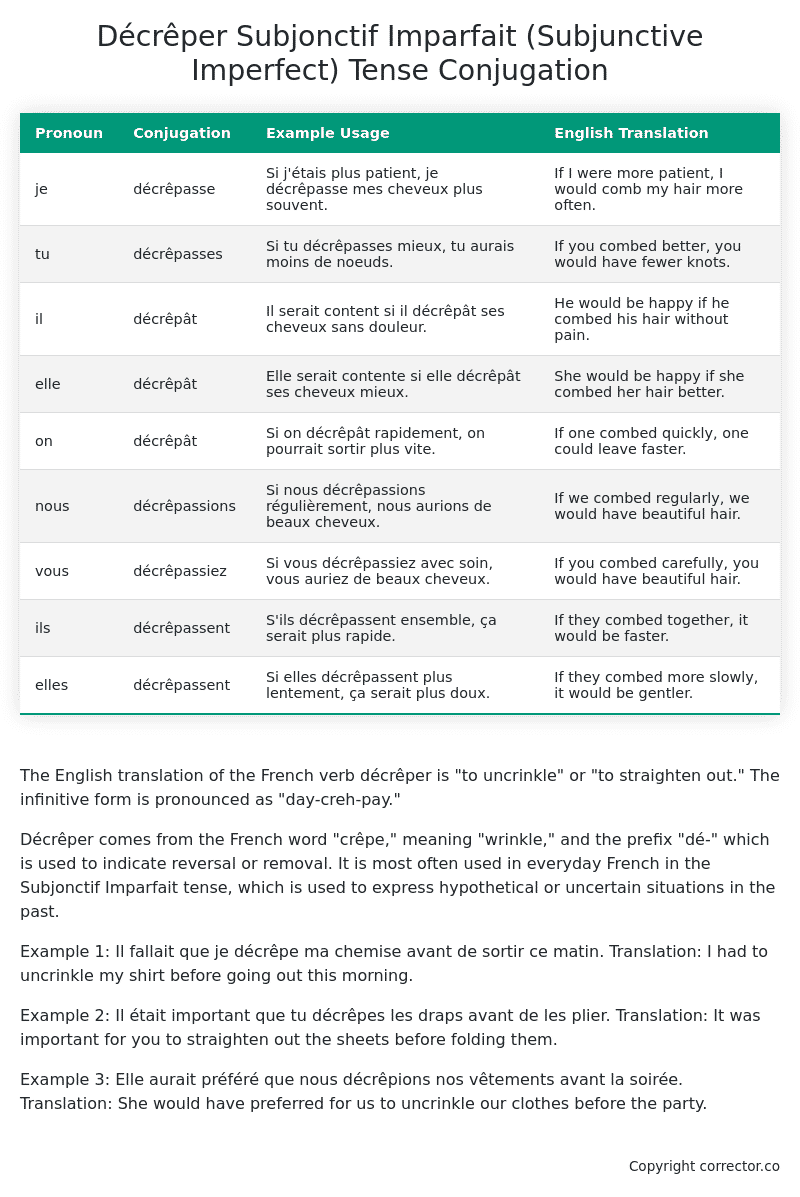Subjonctif Imparfait (Subjunctive Imperfect) Tense Conjugation of the French Verb décrêper
Introduction to the verb décrêper
The English translation of the French verb décrêper is “to uncrinkle” or “to straighten out.” The infinitive form is pronounced as “day-creh-pay.”
Décrêper comes from the French word “crêpe,” meaning “wrinkle,” and the prefix “dé-” which is used to indicate reversal or removal. It is most often used in everyday French in the Subjonctif Imparfait tense, which is used to express hypothetical or uncertain situations in the past.
Example 1: Il fallait que je décrêpe ma chemise avant de sortir ce matin.
Translation: I had to uncrinkle my shirt before going out this morning.
Example 2: Il était important que tu décrêpes les draps avant de les plier.
Translation: It was important for you to straighten out the sheets before folding them.
Example 3: Elle aurait préféré que nous décrêpions nos vêtements avant la soirée.
Translation: She would have preferred for us to uncrinkle our clothes before the party.
Table of the Subjonctif Imparfait (Subjunctive Imperfect) Tense Conjugation of décrêper
| Pronoun | Conjugation | Example Usage | English Translation |
|---|---|---|---|
| je | décrêpasse | Si j’étais plus patient, je décrêpasse mes cheveux plus souvent. | If I were more patient, I would comb my hair more often. |
| tu | décrêpasses | Si tu décrêpasses mieux, tu aurais moins de noeuds. | If you combed better, you would have fewer knots. |
| il | décrêpât | Il serait content si il décrêpât ses cheveux sans douleur. | He would be happy if he combed his hair without pain. |
| elle | décrêpât | Elle serait contente si elle décrêpât ses cheveux mieux. | She would be happy if she combed her hair better. |
| on | décrêpât | Si on décrêpât rapidement, on pourrait sortir plus vite. | If one combed quickly, one could leave faster. |
| nous | décrêpassions | Si nous décrêpassions régulièrement, nous aurions de beaux cheveux. | If we combed regularly, we would have beautiful hair. |
| vous | décrêpassiez | Si vous décrêpassiez avec soin, vous auriez de beaux cheveux. | If you combed carefully, you would have beautiful hair. |
| ils | décrêpassent | S’ils décrêpassent ensemble, ça serait plus rapide. | If they combed together, it would be faster. |
| elles | décrêpassent | Si elles décrêpassent plus lentement, ça serait plus doux. | If they combed more slowly, it would be gentler. |
Other Conjugations for Décrêper.
Le Present (Present Tense) Conjugation of the French Verb décrêper
Imparfait (Imperfect) Tense Conjugation of the French Verb décrêper
Passé Simple (Simple Past) Tense Conjugation of the French Verb décrêper
Passé Composé (Present Perfect) Tense Conjugation of the French Verb décrêper
Futur Simple (Simple Future) Tense Conjugation of the French Verb décrêper
Futur Proche (Near Future) Tense Conjugation of the French Verb décrêper
Plus-que-parfait (Pluperfect) Tense Conjugation of the French Verb décrêper
Passé Antérieur (Past Anterior) Tense Conjugation of the French Verb décrêper
Futur Antérieur (Future Anterior) Tense Conjugation of the French Verb décrêper
Subjonctif Présent (Subjunctive Present) Tense Conjugation of the French Verb décrêper
Subjonctif Passé (Subjunctive Past) Tense Conjugation of the French Verb décrêper
Subjonctif Imparfait (Subjunctive Imperfect) Tense Conjugation of the French Verb décrêper (this article)
Subjonctif Plus-que-parfait (Subjunctive Pluperfect) Tense Conjugation of the French Verb décrêper
Conditionnel Présent (Conditional Present) Tense Conjugation of the French Verb décrêper
Conditionnel Passé (Conditional Past) Tense Conjugation of the French Verb décrêper
L’impératif Présent (Imperative Present) Tense Conjugation of the French Verb décrêper
L’infinitif Présent (Infinitive Present) Tense Conjugation of the French Verb décrêper
Struggling with French verbs or the language in general? Why not use our free French Grammar Checker – no registration required!
Get a FREE Download Study Sheet of this Conjugation 🔥
Simply right click the image below, click “save image” and get your free reference for the décrêper Subjonctif Imparfait tense conjugation!

Décrêper – About the French Subjonctif Imparfait (Subjunctive Imperfect) Tense
Formation
Common Everyday Usage Patterns
Interactions with Other Tenses
Subjonctif Présent
Indicatif Passé Composé
Conditional
Conditional Perfect
Summary
I hope you enjoyed this article on the verb décrêper. Still in a learning mood? Check out another TOTALLY random French verb conjugation!


